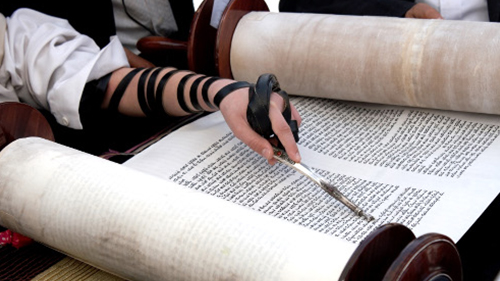Go, worship the Lord your God! Who are the ones to go? Moses replied, “We will all go, young and old. We will go with our sons and our daughters, our flocks and our herds; for we must observe the Lord’s festival.” (Exod. 10:8-9) Jewish tradition declares that “God, Israel and the Torah are One.” […]
God spoke to Moses and said to him, “I am the Lord. I appeared to Abraham, Isaac and Jacob as El Shaddai, but I did not make Myself known to them by my Name [Yod, Hay, Vov, Hay].” (Exod. 6:2-3)
Judaism has always shown its reverence for the name of God by the tradition of not pronouncing it. Thus, the letters Yod, Hay, Vov, Hay are combined with the vowels for Elohim and the pronounced word Adoshem or “Lord” is substituted for the vocalization.
The Torah portion Va’yechi is the concluding parsha of the first book of Torah, B’reishit. It ends the narrative of the founding mothers and fathers of our folk and faith, and also concludes the complex and compelling story of Joseph. As such, it has many aspects of endings, including Jacob’s death-bed blessings given to his sons and grandsons plus explicit instructions regarding his burial.
But Jacob said, “No, I pray you; if you would do me this favor, accept from me this gift; for to see your face is like seeing the face of God and you have received me favorably.” (Gen. 33:10) Few narratives in the Bible have touched me as deeply as does the story of Jacob’s reconciliation with his brother, Esau, as recounted in this week’s parashah.
One aspect of Torah study that I love is when our sages see something in the grammar of the Hebrew of the Torah itself that stands out to them as unusual. It might be a small and seemingly insignificant or trivial matter to the Hebrew reader like a vowel or letter that appears out of place in a sentence. It would not even get our attention in the English translation. Yet, for the rabbis who have laser-like focus on the Hebrew text, they immediately presume that there are no accidents of grammar. They always believe that there is a hidden meaning behind every letter and vowel in the Torah. The challenge is to figure out what is the hidden meaning.
For the second time in my life, I witnessed a baby being redeemed from a life of service in the priesthood at the Temple in Jerusalem. The first, I was that baby. At this, my second Pidyon haBen, Raffi Shane Wolfe, the grandson of our WUPJ Chair Carole Sterling, was redeemed. As a staunch Liberal […]
The Hebrew word “Naso” means “to lift up” and with this word God commanded Moses and Aaron to “lift up” the Children of Israel by concluding the census. It is a curious idea at first glance, to “lift up” in order to take a census, but it makes sense.
There are periods in our lives in which we are neither here nor there. When we leave home, our land or our community and take Avraham Avinu as our example of Lech Lecha, moving toward a place we do not know, everything is seem to be difficult. We were accustomed to the people, to our home, to the streets and avenues of our city, and above all we knew how to deal with known troubles, for we knew o ground and how to keep walking there.
A month ago I was sitting in an elementary school classroom on plastic chairs waiting for Friday night Shabbat Services to begin in the town of Gedera, which is south of Rechovot. This is an amazing congregation which has fought in court against the local government in order to win the right to hold their Shabbat services in a local elementary school.


